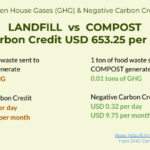Revolutionizing Waste Management: Exploring the Most Effective Waste Collection Systems for Malaysia
Waste Collection Systems for Malaysia
 In an era where sustainability and environmental consciousness are at the forefront, cities and communities worldwide are reevaluating their waste management strategies.
In an era where sustainability and environmental consciousness are at the forefront, cities and communities worldwide are reevaluating their waste management strategies.
Innovative waste collection systems are emerging as key players in the quest for more efficient, cost-effective, and environmentally friendly solutions.
Let’s delve into some of the most effective waste collection systems making waves globally.
- Smart Bin Technology: Cities are increasingly adopting smart bin technology to optimize waste collection routes and reduce operational costs. These intelligent bins are equipped with sensors that monitor waste levels in real-time. Waste management teams can then optimize collection routes based on the actual fill levels, minimizing unnecessary pickups and fuel consumption.
- Automated Waste Collection Systems: Automated waste collection systems, often found in urban developments and large-scale complexes, utilize underground pipelines to transport waste directly to a centralized collection point. This system reduces the need for traditional waste trucks, minimizing traffic congestion, noise pollution, and operational costs. Cities like Stockholm and Barcelona have successfully implemented automated waste collection, showcasing its efficiency.
- Pay-As-You-Throw Programs: Incentivizing waste reduction, pay-as-you-throw programs charge residents based on the amount of waste they generate. This approach encourages individuals to minimize waste and recycle more, leading to reduced overall waste collection volumes. Cities like Taipei and Seattle have experienced success with such programs, fostering a culture of responsible waste disposal.
- Mobile App Integration: Mobile applications are transforming waste management by providing real-time information to both residents and waste collection teams. These apps allow users to schedule pickups for bulky items, report issues, and receive notifications about waste collection schedules. Cities such as San Francisco and Tokyo are leveraging mobile app integration to enhance communication and efficiency in waste management.
- Community-Based Recycling Initiatives: Engaging communities in waste management efforts is proving highly effective. Community-based recycling initiatives involve residents actively participating in waste separation and recycling programs. This not only reduces the burden on landfills but also fosters a sense of environmental responsibility. Curitiba in Brazil and Kamikatsu in Japan are notable examples where community involvement has led to successful waste reduction.
Challenges and Future Developments
While these waste collection systems showcase remarkable efficiency, challenges such as initial implementation costs, public education, and infrastructure requirements persist. However, ongoing research and technological advancements are addressing these challenges, paving the way for more widespread adoption of effective waste management practices.
Conclusion
The landscape of waste management is undergoing a transformative shift, propelled by the adoption of innovative collection systems. From smart technologies to community engagement initiatives, cities globally are embracing effective waste management strategies that not only enhance operational efficiency but also contribute to a more sustainable and environmentally conscious future. As these systems continue to evolve, the prospect of achieving cleaner, greener communities becomes increasingly attainable.


